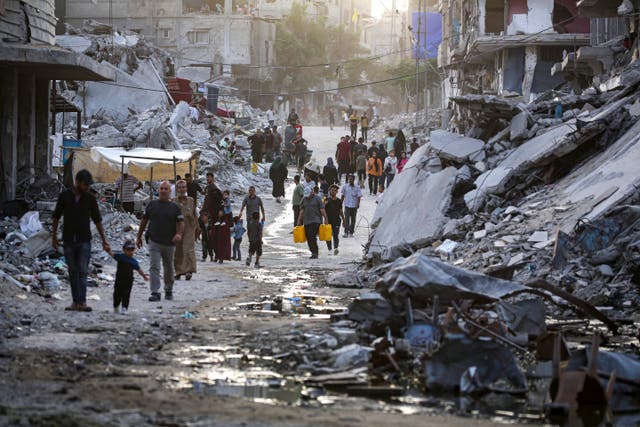Humanitarian concerns and the treatment of detainees were among the reasons the UK has suspended some arms sales to Israel, the Government revealed as it faced international backlash.
The Government is suspending around 30 arms export licences to Israel amid concerns a “clear risk” exists that they could be used to breach international humanitarian law.
Foreign Secretary David Lammy said a review conducted by the UK Government could not “arbitrate on whether or not Israel has breached international humanitarian law” in Gaza, but ministers have a legal duty to review export licences.
Factors key to the Government’s decision include “insufficient” humanitarian aid to the people of Gaza, and reports of the mistreatment of detainees, a summary of the process undertaken by ministers revealed.
Senior Israeli officials were among those who criticised the UK’s decision, with the country’s defence minister Yoav Gallant claiming he was “deeply disheartened” by what he described as “sanctions placed by the UK Government on export licenses to Israel’s defence establishment”.

Speaking in the Commons, Mr Lammy said there was a “clear risk that the items might be used to commit or facilitate serious violations of international humanitarian law” based on an assessment he had received, adding there was no choice but to halt some arms exports.
Business Secretary Jonathan Reynolds, in a written ministerial statement, said the suspension included “components for fighter aircraft (F-16s), parts for unmanned aerial vehicles (UAVs), naval systems, and targeting equipment”.
Summary papers published by the Government said the assessment which Mr Lammy relied upon for his decision found “Israel has not fulfilled its duty as Occupying Power to ensure – to the fullest extent of the means available to it – those supplies essential to the survival of the population of Gaza.
“It has concluded that the level of aid remains insufficient.”
It also said there “have been credible claims of the mistreatment of detainees” at a “volume and consistency” which suggest “at least some instances of mistreatment contrary to IHL” (international humanitarian law).
The Government suggested however, that it had not been possible to come to a “determinative judgement” on “allegations regarding Israel’s conduct of hostilities”, partly because of the “opaque and contested information environment in Gaza”.
Following the announcement by the UK, Israeli defence minister Yoav Gallant wrote on X, formerly Twitter: “Deeply disheartened to learn of the sanctions placed by the UK Government on export licenses to Israel’s defence establishment.
“This comes at a time when we fight a war on seven different fronts – a war that was launched by a savage terrorist organization, unprovoked.”
“At a time when we mourn six hostages who were executed in cold blood by Hamas inside tunnels in Gaza. At a time when we fight to bring 101 hostages home,” he said.
There was also criticism from closer to home, with Chief Rabbi Sir Ephraim Mirvis, writing on X that the decision “beggars belief” while “Israel is fighting a war for its very survival on seven fronts forced upon it on October 7, and at the very moment when six hostages murdered in cold blood by cruel terrorists were being buried by their families”.




Comments: Our rules
We want our comments to be a lively and valuable part of our community - a place where readers can debate and engage with the most important local issues. The ability to comment on our stories is a privilege, not a right, however, and that privilege may be withdrawn if it is abused or misused.
Please report any comments that break our rules.
Read the rules hereLast Updated:
Report this comment Cancel